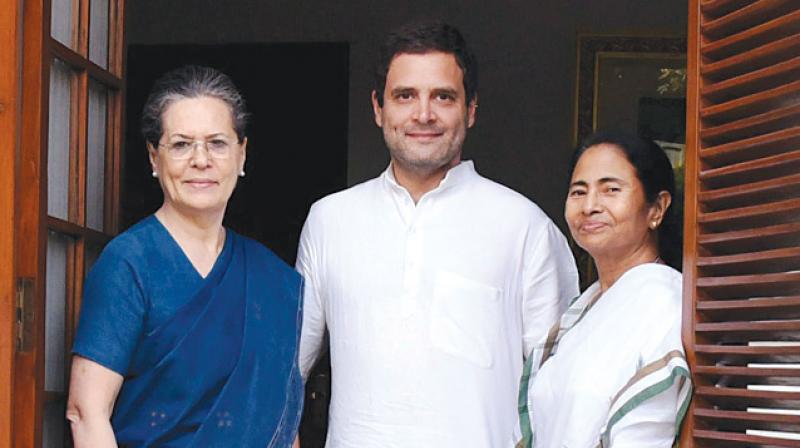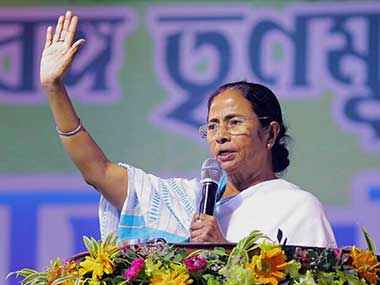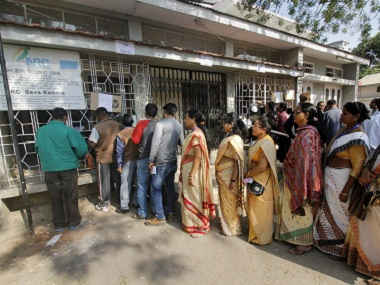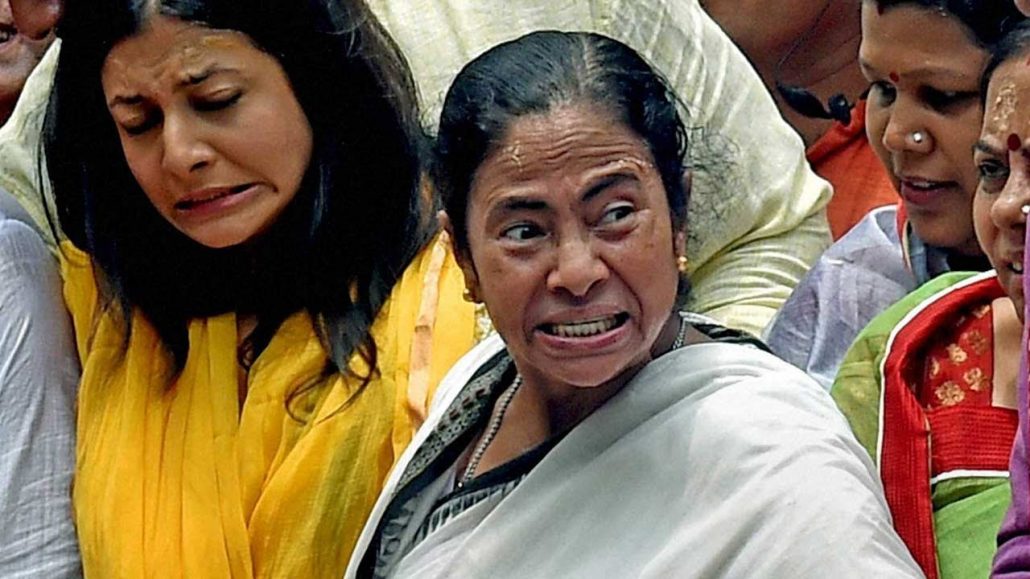
Mamata Banerjee is playing with fire. As a serving chief minister and a senior political leader with a rising national profile, her words carry weight. And also consequences. In the political controversy over publishing of the second National Register of Citizens (NRC) draft, she finds an opportunity to strengthen TMC’s foothold beyond West Bengal into Assam. She should be careful.
Her repeated inflammatory and irresponsible remarks may destabilise a sensitive issue that lies at the crossroads of a long-standing socio-economic and ethno-cultural tension between India’s smaller indigenous communities in the North East and illegal migrants from Bangladesh who have trooped into the country on a massive scale for over a half a century.
Unchecked and sustained infiltration has raised both demographic and national security challenges. Scholars have pointed out that insurgency movements in North East, especially Assam, ‘rose on a response to illegal immigration’ and the large-scale infiltration of chiefly Muslim immigrants has given rise to Pakistan’s ISI-sponsored Islamist militancy in the state (The Contours of Assam Insurgency by Dinesh Kotwal, Research Fellow, Institute for Defence Studies and Analysis).

In their March 2016 paper, ‘Socio-Economic and Political Consequence of Illegal Migration into Assam from Bangladesh‘, professors J Das and D Talukdar wrote: “The flow of immigrants started during the rule of the British and continues till today due to the pull and push factors. The deportation of illegal migrants becomes difficult due to the lack of strong law and political will, as illegal migrants are used as a vote bank by different political parties. The data provided in the study indicates that if necessary steps are not taken immediately, Assam, the elder sister of North East India would lose its identity from the map of India very soon.”
Sanjay Bhardwaj, Assistant Professor, Centre for South Asian Studies, JNU, points out in his paper for CLAWS Journal citing various sources that “the growth rates of the Muslim population, according to the 2001 census, are the highest precisely in the districts that share a border with, or lie close to the border with Bangladesh, for example, in Assam, this is particularly in Dhubri, Barpeta, Karimganj, and Hailakandi.”
The 1998 report on ‘Illegal Migration in Assam’ submitted to the President of India by the then Assam Governor Lt Gen SK Sinha pointed out that the “Muslim population of Assam has shown a rise of 77.42 percent in 1991 from what it was in 1971. The Hindu population has risen by nearly 41.89 percent in this period… As per the 1991 census, four districts (Dhubri, Goalpara, Barpeta and Hailakandi) have become Muslim-majority districts. Two more districts (Nowgaon and Karimganj) should have become so by 1998 and one district (Morigaon) is fast approaching this population.”
The Assam Governor report also shed light on the historical background of infiltration, mentioned the case for ‘lebensraum‘ (living space) made by Bangladesh politicians and intellectuals, and held as contributing factors the action of some political parties ‘(who) have been encouraging and even helping illegal migration, with a view to building vote banks.’
The prolonged infiltration and subsequent demographic changes sparked an existential fear among Assam’s Ahoms, Bodos, Koch Rajbonshis, Santhalas, Kukis and many other smaller tribes and communities, and in the 1970s, a prolonged, grassroot-level student agitation in Assam took shape that resulted in the loss of over a hundred lives. It eventually led to the signing of the Assam Accord between the Rajiv Gandhi-led Congress government in 1985 and leaders of the Assam movement.
The Accord holds that all illegal aliens who entered the state between January 1966 and March 1971 would be disenfranchised for ten years, and those who came after March 1971 would be deported.
In the Sarbananda Sonowal versus Union of India case in 2005, a three-judge Supreme Court bench of Justices RC Lahoti, GP Mathur and PK Balasubramanyan had observed that:
“22. The dangerous consequences of large scale illegal migration from Bangladesh, both for the people of Assam and more for the nation as a whole, need to be emphatically stressed. No misconceived and mistaken notions of secularism should be allowed to come in the way of doing so.
23. As a result of population movement from Bangladesh, the spectre looms large of the indigenous people of Assam being reduced to a minority in their home State. Their cultural survival will be in jeopardy, their political control will be a weakened and their employment opportunities will be undermined….”
Further, the Supreme Court also observed that: “(5.8) Foreigners who came to Assam on or after 25 March, 1971 shall continue to be detected, deleted and expelled in accordance with law. Immediate and practical steps shall be taken to expel such foreigners.”
In his seminal book ‘Sons of the Soil: Migration and Ethnic Conflict in India (Princeton University Press, 08-Mar-2015)’, American scholar Myron Weiner — whose area of expertise included internal and international migration, ethnic conflict, political demography, among others — pointed out that “if we accept the 1891 census estimate that one-fourth of the population of the Brahmaputra Valley was then of migrant origin, we can estimate that the migrant population (and its descendants) in 1971 was more like 8.5 million, as against an ‘indigenous’ population of 6.5 million.”
It is in this context that the Supreme Court in 2013 ordered an upgradation of National Register of Citizens (NRC) to detect cases of illegal immigration from Bangladesh. The process of verification was held between May 2015 and 31 August, 2015, involving 3.29 crore people and included “house-to-house field verification, determination of authenticity of documents, family tree investigations in order to rule out bogus claims of parenthood and linkages and separate hearings for married women.”
Such an elaborate, painstaking arrangement to scrutinise and quantify the alien population in Assam, that carries judicial sanction, was preceded by a sustained, organic mass movement. The exercise is necessary for national security and preserving the identity and social fabric of a multi-cultural, multi-ethnic state that has fallen prey to a campaign of petty politics, obfuscation and deliberate misinformation.
Speaking to the media outside the Parliament building on Wednesday, the West Bengal chief minister claimed the “NRC will destroy relationship between India and Bangladesh. Out of 40 lakh people whose names are not in the list of NRC, only 1 percent could be illegal infiltrators.”
Mamata had earlier warned of a ‘bloodbath’ and “civil war in the country” over NRC and conflated an issue of illegal migration of aliens with free movement of Indian citizens across India.
If Bengalis say Biharis can’t stay in Bengal, South Indian people say North Indians can’t stay there and North Indians say South Indians can’t stay here. What will be state of this country, because we are together. Our country is a family: WB CM Mamata Banerjee in #Delhi pic.twitter.com/c0sf5GZ2nr
— ANI (@ANI) July 31, 2018
There were people who have Aaadhar cards and passports but still their names are not in the draft list. Names of people were removed on the basis of surnames also. Is the Govt trying to do forceful eviction?: West Bengal CM Mamata Banerjee on #NRCAssam pic.twitter.com/AmMfo46kDQ
— ANI (@ANI) July 30, 2018
Mamata also claimed that ‘people are being isolated through a game plan… It’s a plan to throw out Bengali speaking people and Biharis.’
BSP chief Mayawati has joined in. She claimed that the publication of NRC — that vetted 1.9 crore citizens in the first draft and 2.89 crore in the second (out of 3.29 crore applicants) — is ‘anarth‘, and “a catastrophe that would bring more grief to the minorities and the disadvantaged in an election year.”
The debate over NRC is spurious. Nobody has said that this is the final draft, and no one has said that those whose names have not found mention in the second draft will be ‘forcefully evicted’. The BJP has clarified its stand. Party president Amit Shah has said that the second draft isn’t final, there will be enough opportunities for objections and cross-verifications. Names of only those who have not been able to prove their citizenship have been kept out. It is to be noted that under the Foreigners Act, the burden of proof for citizenship lies on the persons claiming to be a citizen.
Union home minister Rajnath Singh has said that it isn’t a “final draft”. Assam chief minister Sonowal and the state home ministry has clarified that ‘based on this draft, no reference case will be sent to the foreigners’ tribunal or put in a detention centre.”

Finally, the Supreme Court has said that those excluded from the list ‘must get a fair chance’ and the draft cannot form the basis of coercive action.An NRC co-ordinator has told The Indian Expressin an interview that “people will get another chance to prove their credentials. Then we will come out with a final NRC. The NRC process will be over then. Even after that, whether a person is an illegal migrant or not is something that can be decided only by judicial scrutiny and that is through a certain set of codes, which has been established in Assam… called the Foreigners Tribunal.”
What, then, is the fuss all about?
The political storm created by some cynical leaders is an attempt to muddy the waters where fishing for minority votes becomes easier. Take Mamata’s revolving stance. In 2005, as TMC chief, she led the charge against Bangladeshi immigrants entering the state of West Bengal and accused the Left Front government of making them part of the voter’s list. To mark her protest, she had thrown a sheaf of papers at the deputy Speaker, and later sent her resignation through an officer of the House.
The Congress has been caught on a sticky wicket, unable to extricate its name from the authorship of the Assam Accord or NRC draft. It has resorted to technicalities to create obstructions in the process and appears to be walking a tightrope. Its difficulties won’t cease with the news that a Wikileaks cable caught Sonia Gandhi vowing to amend the Foreigners Act to create a backdoor entry for illegal aliens.
As reported by Yatish Yadav in Firstpost, the cable, ‘dated 16 February 2006, authored by a US consulate officer in Kolkata had alleged that then Congress president Sonia Gandhi, campaigning for the May 2006 state Assembly election in Assam, in a brazen appeal to the Muslims, offered to amend the Foreigners Act to prevent deportation of illegal Bangladeshi immigrants.’
These positions are unfortunate but not inexplicable. The political process in India is now a perfection of the art of subverting democracy, and not even national security or sovereignty are off the table in exchange for votes. The TMC, BSP, or Congress, for instance, sense in the struggle for Assam’s identity an opportunity to consolidate their minority vote banks. For Mamata, there is the added incentive of extending TMC’s reach in Assam by tapping into the Muslim vote bank and squeezing Congress or AIUDF’s space. Her ambition arises out the sense of security that she feels about her position in Bengal. 2019 isn’t far away and her eyes are fixed firmly on the prime minister’s chair.




